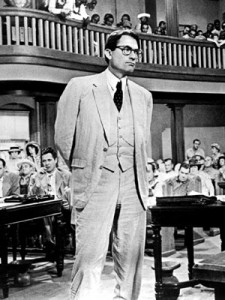Introduction
Over the past three decades,1 members of the bench, bar and legal academy have lamented the decline of professionalism among American lawyers.2 Among the problems now perceived to plague our profession include3 that we, as lawyers, have lost an understanding of the practice of law as a “calling.”4 That changes in the economics of the practice of law have transmuted our practice from a profession to a business.5 That we have lost our way as independent intermediaries and counselors and, in so doing, have become “hired guns,” or “Rambos,” content merely to do our clients’ bidding.6 And, finally, that the warm, collegial civility and comradery that lawyers once shared (or we think they shared) has been swallowed by an eat-or-be-eaten mentality.7
These malignancies, they say, are a cancer on our profession. Lawyers are increasingly disillusioned, clients dissatisfied, and the public disgusted. Because of this crisis, the public perception of lawyers continues to look for a bottom.8 Where is Atticus Finch when the profession needs him?
In response to these widespread concerns, the profession has waged a multi-frontal crusade to improve professionalism in the practice of law. In addition to forming innumerable committees, the organized bar has conducted symposia9 adopted civility creeds10 offered continuing legal education programs,11 and called upon American law schools to teach professionalism to law students.12 Courts have adopted lawyer–and judge–civility codes and, perhaps most controversially, have implemented mandatory professionalism CLE requirements. For example, the Louisiana Supreme Court in 1997 amended its Rules for Continuing Legal Education13 to require that every Louisiana lawyer attend at least one hour of professionalism CLE each year.14 Some of these professionalism codes, creeds and CLE requirements affecting Louisiana lawyers are collected in this section.
Professionalism Resources
General
Dane S. Ciolino, Redefining Professionalism as Seeking, 49 Loy. L. Rev. 229 (2003).
Louisiana
- Louisiana Supreme Court Rules Relating to Litigation Conduct in Louisiana Courts.
- LSBA Committee on the Profession Website.
- LSBA Code of Professionalism.
- Louisiana Association for Justice Lawyer’s Creed.
American Bar Association
- ABA Standing Committee on Professionalism
- ABA List of and Links to Professionalism Codes in the States
- ABA Tort, Trial & Insurance Practice Lawyer’s Creed of Professionalism.
- ABA Section of Litigation Guidelines for Litigation Conduct.
- Excerpted from Dane S. Ciolino, Redefining Professionalism as Seeking, 49 Loy. L. Rev. 229, 229-31 (2003). ↵
- See, e.g., Warren E. Burger, The Decline in Professionalism, 61 Tenn. L. Rev. 1 (1993); see generally Mary Ann Glendon, A Nation Under Lawyers: How the Crisis in the Legal Profession is Transforming American Society (1994); Anthony T. Kronman, The Lost Lawyer: Failing Ideals of the Legal Profession (1993); Sol M. Linowitz & Martin Mayer, The Betrayed Profession: Lawyering at the End of the Twentieth Century (1994); see also Samuel J. Levine, Essay, Faith in Legal Professionalism: Believers and Heretics, 61 Md. L. Rev. 217 (2002); Therese Maynard, Teaching Professionalism: The Lawyer as Professional, 34 Ga. L. Rev. 895, 895 n.2 (2000) (“the literature teems with articles that describe, often in rather distressing terms, the crisis within the legal profession today”); Fred C. Zacharias, Reconciling Professionalism and Client Interests, 36 Wm. & Mary L. Rev. 1303, 1307 (1995) (“over the past two decades, hundreds of articles and speeches have focused on the meaning of professionalism, its perceived ‘decline,’ and steps the bar should take to improve it”). ↵
- Some also have expressed concerns about the general competency of lawyers and their compliance with disciplinary codes. See A.B.A., Final Report and Recommendations of the Task Force on Professional Competence (1983). But this is more a matter of “legal ethics” than “professionalism.” ↵
- See Phoebe A. Haddon, Education for a Public Calling in the 21st Century, 69 Wash. L. Rev. 573 (1994). ↵
- See, e.g., Wm. Reece Smith, Jr., Teaching and Learning Professionalism, 32 Wake Forest L. Rev. 613, 613 (1997); Eleanor W. Myers, “Simple Truths” About Moral Education, 45 Am. U.L. Rev. 823, 827 (1996); Norman Bowie, The Law: From a Profession to a Business, 47 Vand. L. Rev. 741 (1988). ↵
- See Robert F. Cochran, Jr., Professionalism in the Postmodern Age: Its Death, Attempts at Resuscitation, and Alternate Sources of Virtue, 14 Notre Dame J.L. Ethics & Pub. Pol’y 305, 311-13 (2000); Margaret Ann Wilkinson, Peter Mercer & Terra Strong, Mentor, Mercenary or Melding: An Empirical Inquiry into the Role of the Lawyer, 28 Loy. U. Chi. L.J. 373 (1996); David Luban, The Noblesse Oblige Tradition in the Practice of Law, 41 Vand. L. Rev. 717 (1988). ↵
- See E. Norman Veasey, Rambo Be Gone, 4 Bus. Law Today 12 (Jan/Feb 1995); N. Gregory Smith, Ethics v. Professionalism and the Louisiana Supreme Court, 58 La. L. Rev. 539, 541 (1998) (noting that bar journals, legal periodicals and discussions with practitioners “reveal that incivility and unprofessional conduct are far more pervasive than lawyer incompetency or dishonesty.”). ↵
- See, e.g., Erica Moeser, Standards, Change, Politics, and the Millennium, 28 Loy. U. Chi. L.J. 229, 230 (1996). ↵
- See, e.g., A.B.A., Teaching and Learning Professionalism: Symposium Proceedings (1996); A.B.A., Teaching and Learning Professionalism: Report of the Professionalism Committee (1996). ↵
- More than 100 county, city and state bar associations, and many federal courts, have adopted civility codes. See, e.g., Allen K. Harris, The Professionalism Crisis: The “Z” Words and Other Rambo Tactics, 53 S.C. L. Rev. 549, 582-83 (2002). ↵
- See, e.g., Joryn Jenkins, Teaching and Learning Professionalism, Fed. Lawyer, Aug. 1997, at 6 (discussing “The Florida Lawyers Ethics School”). ↵
- See A.B.A. Report on Teaching and Learning Professionalism, supra, at 13-25 (“Law School Professionalism Training”). ↵
- See Smith, Ethics v. Professionalism, supra, at 544-47 (discussing the new rule). ↵
- Louisiana Supreme Court Order of May 23, 1997. The general reception among practicing, CLE-attending Louisiana lawyers to professionalism CLE has been chilly, at best, and hostile, at worst. ↵


